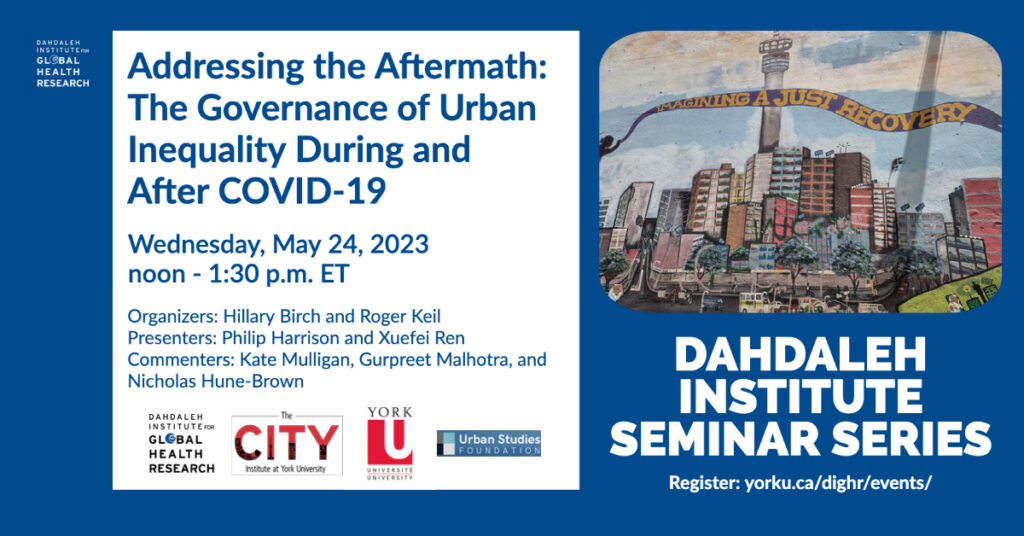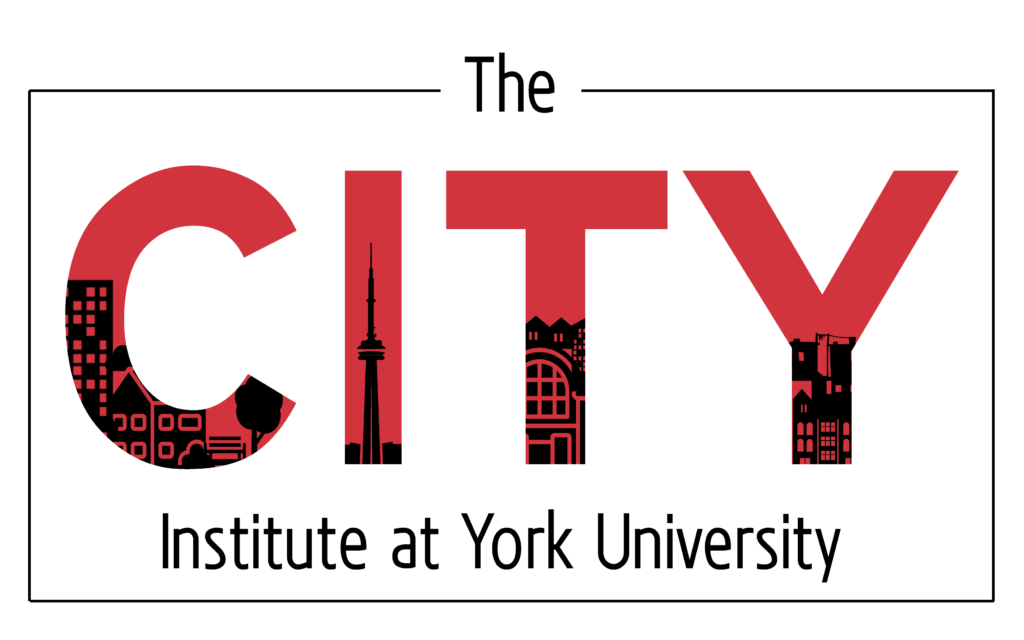Addressing the Aftermath: The Governance of Urban Inequality During and After COVID-19
Preliminary Results of Affected and Engaged Communities in Toronto, Chicago, and Johannesburg
The pandemic has affected social and geographical areas and urban sectors differently. This project sought to understand why cities have responded the ways they have, and how the pandemic has changed existing forms of urban governance. In our study, Chicago and Toronto represent the wealthier cities in the Global North. Johannesburg represents the urban experience in the Global South. During COVID-19, these three cities launched various programs and projects to deal with the impact of the pandemic, forging new partnerships between grassroots organizations, citizens, and municipal authorities. Through this research, we will generate a database of policies and programs from Chicago, Toronto, and Johannesburg, and offer explanations on the convergence and divergence of their policy choices.
In our research, a common set of experiences pointed to the coexistence of inequalities suffered by some communities – racialized, poor, precariously housed, employed in frontline jobs – and innovative grassroots community responses in light of government failure to address these inequalities immediately during the crisis and beyond in more structural terms. This panel will focus on the Toronto case but importantly draw on similar experiences in Chicago and Johannesburg.
Read more about “The City after COVID-19” project.

This event is co-sponsored by the CITY Institute at York University

Speaker profiles
Hillary Birch is a PhD student in Environmental Studies in the Faculty of Environmental and Urban Change at York University where she is a SSHRC Doctoral Fellow and a Dahdaleh Global Health Graduate Scholar. She holds a Master’s degree in urban governance from Sciences Po, in Paris, France where she studied the urban governance of Ebola in Monrovia, Liberia. She also holds a Master’s degree in Political Science from McGill University. Hillary has worked in various roles related to global health concerning sexual and reproductive health and early child development. Her PhD explores how projects of global health intersect with processes of urbanization that shape flows of water in a city and change its quality.
Nicholas Hune-Brown is an award-winning magazine writer and editor in Toronto. He is the Senior Editor at The Local, an online magazine about health and social issues.
Philip Harrison is the South African Research Chair in Spatial Analysis and City Planning funded by the National Research Foundation and hosted by the University of the Witwatersrand. From 2006 to 2010 he was Executive Director in Development Planning and Urban Management at the City of Johannesburg. Prior to that, Professor Harrison held academic positions at the Universities of the Witwatersrand and Natal. He served as a member of the National Planning Commission in the Office of the President from 2010 to 2015, participating in the formulation of the National Development Plan. Professor Harrison has published widely in the fields of city planning and regional and urban development. His most recent book publication is the jointly edited Densifying the City: Global Cases and Johannesburg.
Roger Keil is Professor in the Faculty of Environmental and Urban Change, York University. He researches global suburbanization, urban political ecology, cities and infectious disease, infrastructure, and regional governance. Among his publications are Suburban Planet (Polity, 2018) and After Suburbia (UTP, ed. with Fulong Wu, 2022) as well as Pandemic Urbanism (Polity, 2023, with S.Harris Ali and Creighton Connolly) and Turning Up the Heat: Urban political ecology for a climate emergency (MUP, ed. with Maria Kaika, Tait Mandler and Yannis Tzaninis, 2023). Keil is a Fellow of CIFAR’s Humanity’s Urban Future program.
Gurpreet S. Malhotra has been a professional in Human Services for over 32 years and is currently the Chief Executive Officer at Indus Community Services, which is a leading provider of culturally responsive community and health services. The agency has seven locations and a dedicated staff complement of over a hundred and forty. Preceding that he was the principal of his own consultancy and worked at the Region of Peel as the Director of Strategic Planning, Policy and Partnerships in the Human Services Department. Prior to that, he served as a Senior Policy Advisor at the Ontario Ministry of Community and Social Services. Gurpreet has more than a decade of experience as a Professor and Program Coordinator of the innovative Community Development Diploma Program at the Sheridan Institute of Technology and Advanced Learning where he also served as a Human Rights Advisor. He also holds two degrees in Public Policy and Administration and appears frequently in National and Local news as a community advocate on behalf of the many communities he serves.
Kate Mulligan is an Assistant Professor in Social and Behavioural Health Sciences at the University of Toronto’s Dalla Lana School of Public Health. She is the senior director of the Canadian Institute for Social Prescribing and advisor to the Canadian Red Cross on knowledge mobilization and determinants of health. Kate was a public member of the Toronto Board of Health from 2019-2022 and a contributing author to the 2021 report of the Chief Public Health Officer of Canada, “A Vision to Transform Canada’s Public Health System.”
Xuefei Ren is Associate Professor of Sociology and Global Urban Studies at Michigan State University. She studies urban governance and the built environment from a comparative perspective. Her latest book, Governing the Urban in China and India (Princeton University Press, 2020) won the 2022 Robert E. Park Best Book Award in urban sociology from American Sociological Association and Honourable mention of Dennis Judd Best Book Award in Urban and Local Politics from American Political Science Association. She is a Public Intellectual Fellow of the National Committee on US.-China Relations, and a fellow of CIFAR’s Humanity’s Urban Future program.
Register below and join us on Wednesday, May 24 at noon
RSVP
Registration for this event has closed.
Thank you for your interest in this seminar.
Please find the recap and recording here.

